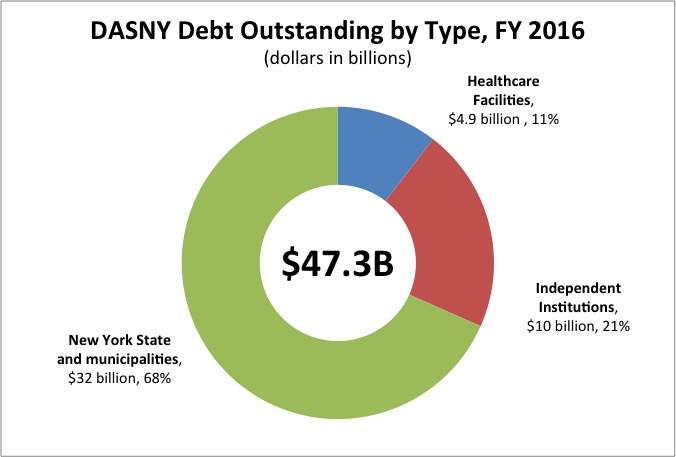The Dormitory Authority of the State of New York (DASNY) is a public benefit corporation that manages construction of buildings and provides low-cost financing for public and nonprofit institutions. Initially established in 1944 to finance and construct dormitories, DASNY’s portfolio has expanded to include higher education, health care, mental health, courts and other public works. In fiscal year 2016 DASNY borrowed $2.8 billion on behalf of other entities and managed more than 1,000 projects, from which it earns transaction fees. DASNY’s expertise in project management has made it the home for the newly created Design and Construction Corporation (DCC), an entity intended to monitor major public works and make recommendations for improving their management.
DASNY the Borrower
DASNY is one of the largest financiers of social infrastructure in the United States: At the end of fiscal year 2015 DASNY had more than $47 billion in debt outstanding. The largest share of this debt, $32 billion, has been issued on behalf of the state and its municipalities and is repaid directly with taxes and fees. Another portion – $10 billion, or 21 percent – is on behalf of independent colleges and universities as well as other non-health care related nonprofit organizations. The smallest – $4.9 billion, or 10 percent – is debt outstanding on behalf of nonprofit health care entities.
 DASNY became a prominent financing institution for two reasons. First, it provides low-cost capital: it makes tax-exempt financing available to nonprofit institutions, and can be an alternative source of financing for local governments and public universities with poor credit ratings. In fiscal year 2016, all but one of DASNY’s public debt issuances were rated A3 or higher by Moody’s and A- or higher by Standard and Poor’s.
DASNY became a prominent financing institution for two reasons. First, it provides low-cost capital: it makes tax-exempt financing available to nonprofit institutions, and can be an alternative source of financing for local governments and public universities with poor credit ratings. In fiscal year 2016, all but one of DASNY’s public debt issuances were rated A3 or higher by Moody’s and A- or higher by Standard and Poor’s.
Second, DASNY has greater flexibility to borrow than the state: Public authorities can borrow on behalf of the state with legislative authorization, while state general obligation debt requires voter approval under the state Constitution. According to the New York State Comptroller’s Office, this type of “backdoor borrowing” has grown from $35 billion in fiscal year 2003 to $48 billion as of the end of fiscal year 2015. Of this amount, $24 billion is attributed to DASNY borrowing for public facilities. This debt remains the state’s obligation and counts against the debt limit when the state is contractually or otherwise obligated to repay the debt from its resources.
DASNY the Builder
In fiscal year 2016 DASNY managed construction projects with a cumulative value of nearly $6 billion. This included the completion of the $687 million Advance Science Research Center on the campus of City College of New York in Harlem and $120 million for eight Homeless Housing Assistance Corporation projects located across the state.
DASNY has developed a reputation for getting projects done efficiently, and the number of projects managed by DASNY has doubled since 2006 from 450 to 1,068 in 2016. In order to harness its expertise to improve the record of other agencies that oversee major public works, State leaders created the New York State Design and Construction Corporation (DCC). The DCC, housed under DASNY and to be led by a three-member board designated by the governor, will be tasked with overseeing any state public works project greater than $50 million. DCC will monitor these projects and identify risks for delays, cost overruns or quality deficiencies, and provide recommendations to the managing entity.
The DCC is not yet up and running and how it will exercise its authority is still unclear. Additional guidance in capital planning and construction management may help illuminate important weaknesses, or may simply constitute a redundant and unneeded layer of oversight that will blur the lines of responsibility and accountability. The DCC can make recommendations, and the project’s sponsor has the right to refuse them; however, it must justify and document the refusal, and many public entities may not wish to reverse the DCC or incur the added costs in time and resources to do so.
Conclusion
Whether as a borrower or a builder, DASNY is an important state entity for infrastructure investment, and its expertise will continue to help New York state, its municipalities, and nonprofits design, construct, and finance public-purpose infrastructure.


